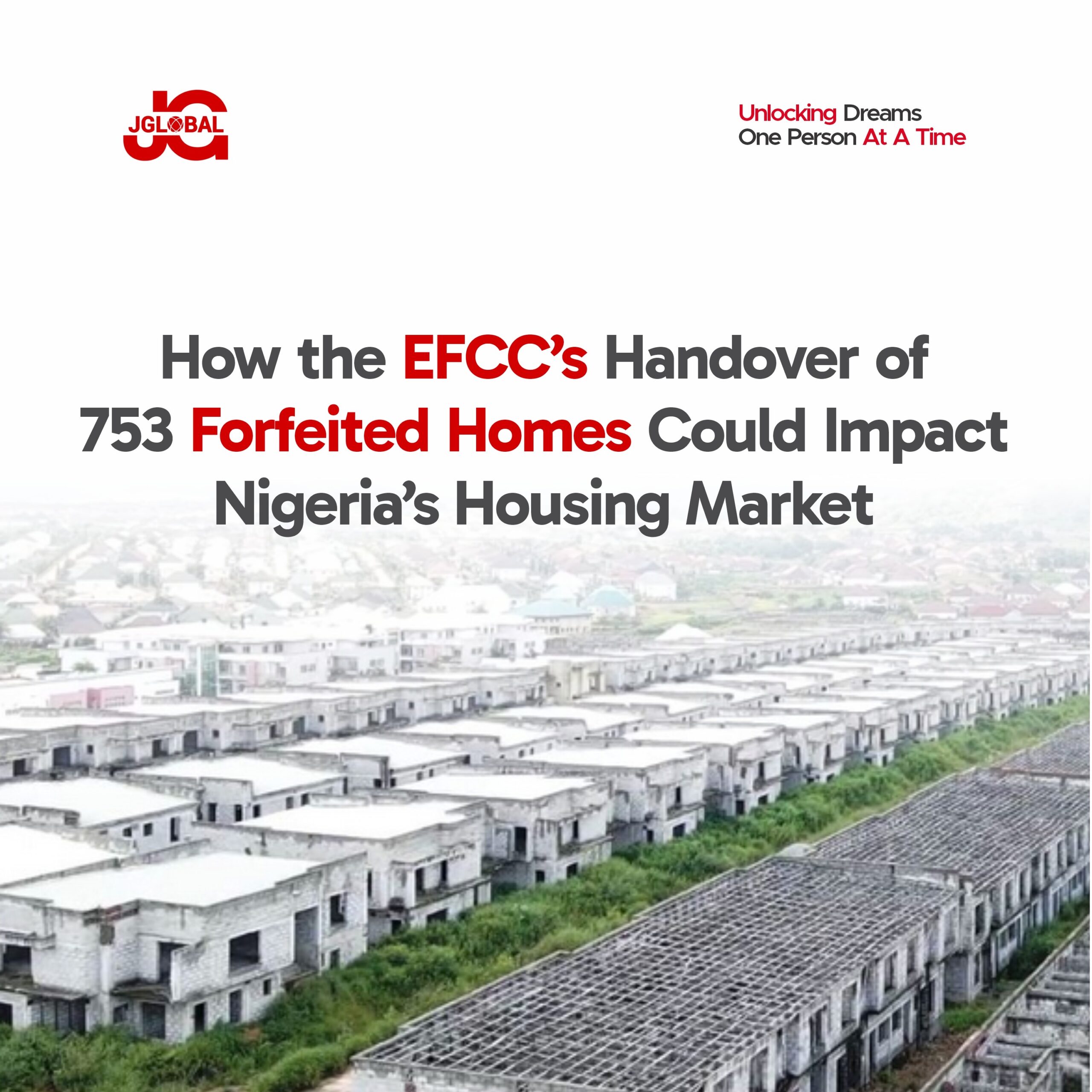How the EFCC’s Handover of 753 Forfeited Homes Could Impact Nigeria’s Housing Market

Introduction
On May 20th 2025, Nigeria’s anti-corruption agency, the Economic and Financial Crimes Commission (EFCC), made headlines when it handed over a massive estate of 753 forfeited homes to the federal government. This estate, located in the popular Lokogoma District of Abuja, is now the largest single property recovery by the EFCC since it was established in 2003.
Now, why is this such a big deal?
For one, the action shows that the Nigerian government is serious about fighting corruption. But more importantly, especially for people concerned about shelter, it opens the door to some big changes in Nigeria’s housing market. With over 21 million Nigerians lacking adequate housing (and counting), releasing 753 ready-to-use homes could provide a quick, if small, relief in a heavily strained system.
But how did the EFCC come to own these homes in the first place and how will it impact the Nigerian Housing Market?
Let’s break that down.
Who Owned the 753 Homes and Why Were They Seized?
The property in question is not just any estate. It spans 150,500 square meters and includes 753 duplexes and apartments all sitting on Plot 109, Cadastral Zone C09, Lokogoma District in Abuja. This isn’t just big; it’s prime real estate.
So, who did this estate originally belong to?
The EFCC traced the ownership to Godwin Emefiele, Nigeria’s immediate past Governor of the Central Bank of Nigeria (CBN). According to court filings and EFCC investigations, Emefiele didn’t buy the property in his name. Instead, he allegedly used three companies as fronts:
- Ice Frozen Food & Ventures
- Kelvito Integrated Service
- Ifeadigo Integrated Services
Together, these companies reportedly paid ₦2.2 billion for the estate. The EFCC claimed that this money came from shady deals, possibly kickbacks, abuse of office, and forex-related fraud while Emefiele was still at the CBN.
To make things even more serious, the EFCC didn’t just make accusations, they went to court and obtained both interim and final forfeiture orders on the property. When Emefiele’s legal team tried to stop the forfeiture, arguing that he wasn’t given enough notice, Justice Jude Onwuegbuzie of the FCT High Court shut it down. The court ruled that the EFCC followed all due legal process as required by the Advance Fee Fraud and Other Fraud Related Offences Act of 2006 (source: PunchNG ).
So in short, the estate is no longer a private asset. As of late 2024, it officially belongs to the Nigerian federal government.
Implications for Nigeria’s Housing Market
Now that the EFCC forfeited 753 homes to the federal government, the big question is: What happens next?
As of 2025, the country is facing a housing deficit of over 21 million units. According to Federal Mortgage Bank estimates, we would need to build at least 550,000 new homes every year for the next 10 years to begin closing this gap. That’s a huge task, especially when you consider the rising cost of land, building materials, and the lack of access to mortgage financing for most Nigerians.
So when the EFCC handed over 753 completed housing units in Lokogoma, a relatively developed area in Abuja, it felt like a win at least on paper.
These homes could be used for different purposes. For example:
- They could be allocated to low- and middle-income civil servants.
- They could be turned into government-backed affordable rental housing.
- Or they might even be sold off to help fund public housing projects across the country.
Any of these decisions would make some difference, but the real impact depends on how the federal government decides to use the homes. If they choose transparency and fairness, this could serve as a model for using recovered assets to benefit everyday Nigerians not just to fight corruption for headlines.
Additionally, this case could set a powerful precedent. It proves that corruptly acquired assets can be redirected toward solving real social issues. Imagine if every seized property in Nigeria was put to good use, housing healthcare workers, teachers, or young families. That’s the kind of transformation this country needs.
EFCC Chairman speaking on recovering of the single largest asset.
Challenges and Considerations
Although EFCC forfeited 753 homes to the federal government, there are still millions of Nigerians living in overcrowded, substandard housing or struggling with unaffordable rent.
Here are some key challenges to keep in mind:
1. Distribution Transparency
How will these houses be allocated? Will they go to the people who truly need them, or will they disappear into the hands of the politically connected? Without a clear, public process, the impact of this recovery could be wasted.
2. Maintenance and Infrastructure
Many recovered properties in Nigeria end up deteriorating due to poor maintenance or bureaucratic delays. If the Lokogoma estate isn’t quickly put to use and properly maintained it could become an abandoned project, which would be a massive loss.
3. Public Trust
Using recovered assets to meet housing needs could boost public confidence in both the EFCC and the government. But mismanagement, favoritism, or silence on the process could have the opposite effect.
4. Broader Housing Policy
While 753 homes won’t solve a 21-million-unit housing crisis, we need more large-scale policy reforms, such as:
- Making land acquisition easier.
- Supporting private sector builders.
- Creating mortgage systems that actually work for average Nigerians.
This handover could be a symbolic first step, but only if it’s followed by a strategic national housing plan.
Conclusion
The EFCC’s handover of 753 forfeited homes to the federal government represents a significant milestone in Nigeria’s anti-corruption efforts and offers a unique opportunity to make a tangible impact on the housing crisis. While this alone will not resolve the housing deficit, it exemplifies how recovered assets can be leveraged to address pressing societal needs. Moving forward, a transparent and strategic approach to the utilization of such assets will be vital in enhancing public trust and improving living conditions for many Nigerians.



